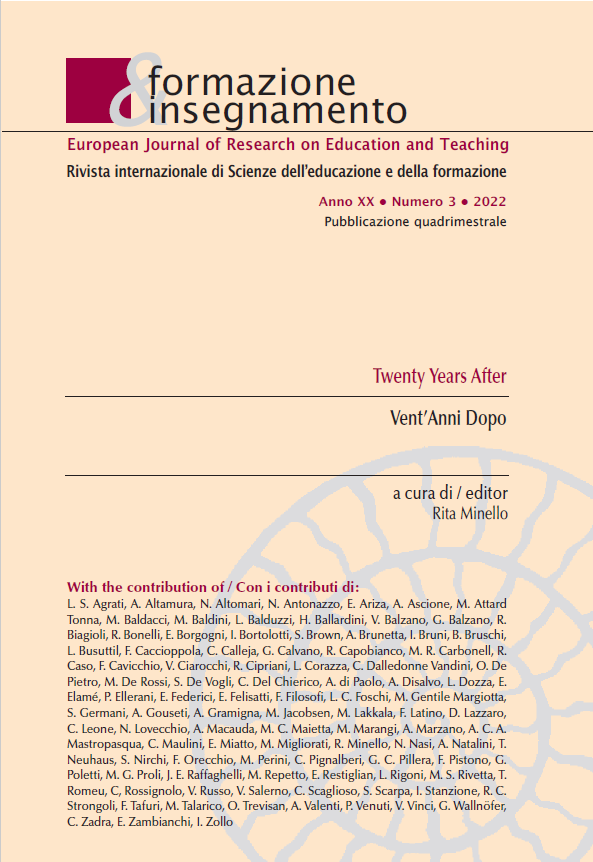Well-being and school climate in primary schools in Veneto: The voice of the teachers
DOI:
https://doi.org/10.7346/-fei-XX-03-22_39Keywords:
Primary school, Well-being, School climate, Educational policies, TALISAbstract
The TALIS international survey on teaching and learning has been collecting teachers' attitudes, opinions, and representations about schoolwork experience, school, and working conditions since 2008. This article presents a survey involving 611 primary school teachers from the Veneto region (Italy), which aimed to investigate teachers' perceptions of school climate and well-being at the end of the 2020/2021 school year. The research used some parts of the tool used in TALIS to investigate whether most teachers work in contexts with a positive professional climate. The results show a high perception of work-related stress, which could interfere with classroom teaching and confirm factors related to a positive school climate, including mutual respect for colleagues' ideas and the possibility of open discussions.
References
Bombardieri, M., Simoni, C. (2021). Stare bene a scuola. Percorsi di resilienza per insegnanti sereni e consapevoli. Trento: Erickson.
Fiorucci, M., Crescenza, G., Rossiello, M.C., Stillo, L. (2021). La scuola che cambia. Relazione educativa, didattica a distanza e rapporti con le famiglie ai tempi del COVID. In Carbone, V., Carrus, G., Pompeo, F., Zizioli, E., (Eds.). (2021). La ricerca dipartimentale ai tempi del Covid-19 (pp. 65-81). Roma: Roma trE-Press.
Kanizsa, S. (2007). Il lavoro educativo: l’importanza della relazione nel processo di insegnamento-apprendimento. Milano: Bruno Mondadori.
OECD (2016). Risultati TALIS 2013: una prospettiva internazionale sull’insegnamento e sull’apprendimento. OECD Publishing. http://dx.doi.org/10.1787/9789264251694-it
OECD (2018a). Teaching and Learning International Survey (TALIS): Teacher Questionnaire, http://www.oecd.org/education/school/TALIS-2018-MS-Teacher-Questionnaire-ENG.pdf
OECD (2018b). Effective Teacher Policies: Insights from PISA. Paris: PISA OECD Publishing. https://doi.org/10.1787/9789264301603-en.
OECD (2019). TALIS 2018 Results (Volume I): Teachers and School Leaders as Lifelong Learners, TALIS, OECD Publishing, Paris. https://doi.org/10.1787/1d0bc92a-en
Maccarini, A. (2014). TALIS 2013 Teaching and Learning International Survey (TALIS). Guida alla lettura del Rapporto Internazionale OCSE. Focus sull’Italia. Introduzione, 7-9. Tratto da: https://www.istruzione.it/allegati/2014/TALIS_Guida_lettura_con_Focus_ITALIA.pdf
Melchiori, R. (2011). Alcuni risultati della ricerca comparativa sui docenti della scuola. Riflessioni sulla ricerca OCSE-TALIS. Supplemento Formazione & Insegnamento, 9(3), 103-115. 10.7346/-fei-IX-04-11_03
Pellegrini, M. (2014). La valutazione degli insegnanti nell’area OECD. Form@re, 4(14), 105-117. http://dx.doi.org/10.13128/formare-15801
Polito, M. (2000). Attivare le risorse del gruppo classe. Nuove strategie per l’apprendimento reciproco e la crescita personale. Trento: Erickson.
Polito, M. (2003). Comunicazione positiva e apprendimento cooperativo: strategie per intrecciare il benessere in classe e il successo formativo. Trento: Erickson.
Renati, R., Zanetti, M. A. (2009). Il clima positivo in classe. Uno strumento per promuovere il cambiamento. Psicologia e Scuola, 29(3), 50-58. http://hdl.handle.net/11571/204115
Ufficio Scolastico Regionale per il Veneto – Direzione Regionale (2020). I dati del Veneto al via dell’anno scolastico 2020/21. Tratto da https://istruzioneveneto.gov.it/wp-content/uploads/2020/10/cart_stampa_202021.pdf
Sarno, E. (2020). Emergenza sanitaria e chiusura di scuole e università. Il divario culturale come ulteriore effetto del covid-19. Documenti geografici, 0(1), 219-229. http://dx.doi.org/10.19246/DOCUGEO2281-7549/202001_13
Downloads
Published
How to Cite
Issue
Section
License
Copyright (c) 2022 Anna Chiara A. Mastropasqua, Emilia Restiglian

This work is licensed under a Creative Commons Attribution 4.0 International License.
Formazione & insegnamento is distributed under Attribution 4.0 International (CC BY 4.0).
For further details, please refer to our Repository & Archiving Policy, as well as our Copyright & Licensing Terms.





